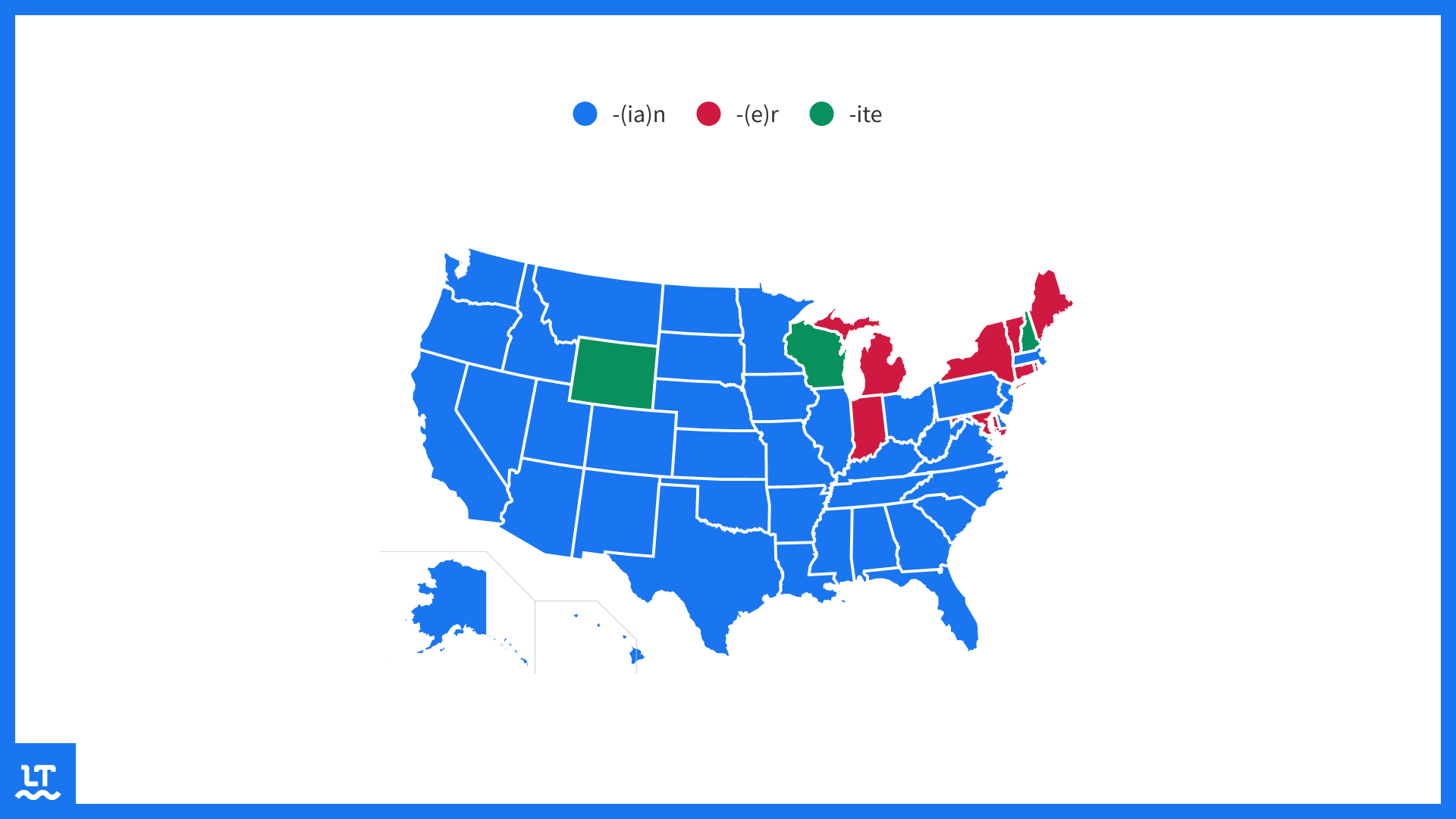It’s a Thin (Border)Line Between Being Linguistically Sound and Politically Correct
How do I spell languages, places, and nationalities correctly? Why should I be sensitive about where to put a hyphen?
- Always uppercase.
- Usually, there is only one correct adjective ending: -ite, -(ia)n, -(e)r.
- Hyphenation for geographic specifications and politically correct identities
- Be sensitive about ethnicities, religions, and origin countries.
Simple Labels for Nationalities, Languages, and Religions
Simple small talk topics like where you come from, or what languages you speak, can create certain spelling challenges. In this article, we show you when to use uppercase and a hyphen, how to create the suitable word forms, and what to keep in mind about geopolitical labels.
Whenever you encounter geographical labels, you can keep in mind that they are always capitalized. This means that every country, state, region, town, river, mountain, capital, continent, lake, ocean, forest, street, park, etc. is spelled in uppercase:
Washington, DC 20500
United States of America
However, not only the names themselves, but also related terms (languages, inhabitants, etc.), as well as religious identities present a majuscule up front:
Repetitive Patterns for Forming Adjectives and Nouns
For nearly every nation or country, there is a referential adjective and a label for its people. This natural connection might be straightforward, like in Sweden—Swedish—the Swedish. But it can be quite distinct, too, such as in the Netherlands—Dutch—the Dutch.
Regarding towns and cities, this pattern seems even more random:
Sydney—Sydney-siders,
Rio de Janeiro—Carioca,
Cape Town—Capetonian,
Lima—Limeño,
New Delhi—Delhiite,
Istanbul—Istanbulite
If you’ve ever wondered why the people of Iceland are labeled Icelanders, while the inhabitants of Thailand are known as Thai instead, you’ll recognize that these so-called demonyms are pretty random. Nevertheless, there are a couple of hints that can at least guide you in a vague direction.
| Typical ending | Commonly found in | Examples |
|---|---|---|
| -ese | (East) Asia | Chinese, Japanese, Burmese, Vietnamese but: Sudanese, Portuguese |
| -i | Middle East and South Asia | Bangladeshi, Iraqi, Israeli, Pakistani, Saudi |
| -(i)an | Europe, Africa, and the Americas | Italian, Norwegian, Russian, Brazilian, Peruvian, Kenyan, Colombian, Moroccan but: Indian, Australian |
| -ish / -ch | Europe | Irish, Spanish, Welsh, Dutch |
Please note that there are also adjectives for nationalities that do not follow any pattern:
Traditionally, the demonyms ending with “-ish/-ch” are combined with the person labels man and woman (plus their plural forms). As this is not politically correct anymore, compounds with persons or avoiding the reference to specific people are two very common strategies to overcome this dilemma:
(the English / the English people)
Coming back to the US, you’ll notice some typical patterns within the fairly arbitrary naming conventions for states:
| Typical ending | Commonly found in | Examples |
|---|---|---|
| -(ia)n | 39 states, all over the country | -n: Alaskan, Kansan, Californian, Texan -an: Tennessean, Ohioan -ian: Floridian, Louisianian, Oregonian, Alabamian |
| -(e)r | Eight states, all of them in the Northeast |
New Yorker, Conneticuter, Michigander, Mainer, Vermonter, Rhode Islander, Marylander, Hoosier (IN) |
| -ite | Just three in total | Wyomingite, Wisconsinite, New Hampshirite |

Modifications With Affixes
Sometimes, one proper noun (or adjective) is not sufficient to specify certain parts of the world. These various cases always require a hyphen to modify the location.
The same applies yet again for political, and religious classifications:
Other words like transatlantic or transcontinental are never hyphenated. Similarly, frequently used geographic terms for a specific area are usually spelled without a hyphen:
Hyphenation of National Identities
Nowadays, this arbitrary labelling comes to a challenging head. As geographic names always refer to real people, and xenophobia and political conflicts are still ongoing problems in the modern world, you should pay close attention to giving certain persons an ideological, or identity-creating term.
There are some references from colonial times which you should never use in order to retain your political correctness. Afro-Americans is replaced by African Americans, or the Black community, as the hyphenation appears offensive for some people.
The specification of non-American descendants used to form hyphenated national identities:
This created a sense of being “in between” the compounds. Instead of the child combining the features of Asian and Irish ancestry into one, unified American identity, they constitute a “new group” of mixed ethnicities.
With regard to modern society, this categorization is undoubtedly highly problematic. That is why the hyphen is omitted in these adjective pairs:
Please note that it happens to be okay to keep the hyphen in cases where you want to emphasize both components simultaneously:
As you can see, it’s not that simple to describe our modern-day world—and especially its habitants. LanguageTool always detects when your writing is in a state. Even if you say denial is just a river in Egypt, it reliably and immediately reminds you that something stylistic or grammatical is rotten in Denmark. This is also useful for the correct spelling of geographic terms, since not all is Chinese to LanguageTool.
-
- geopolitical identity (Indian)
- religious identity (Hindu)
- language names (Hindi)
as they aren’t the same!
